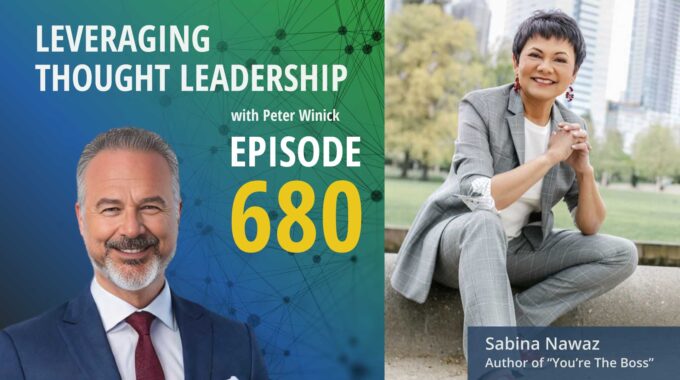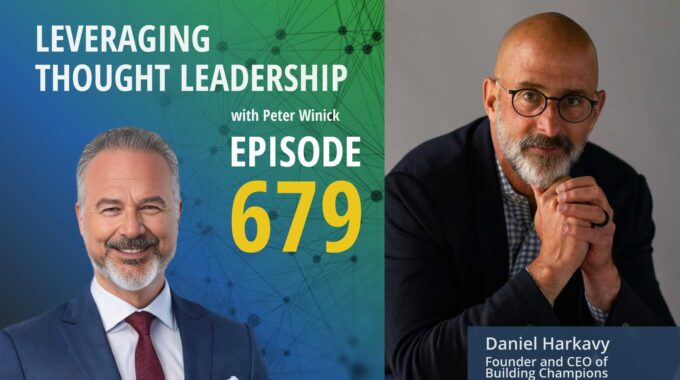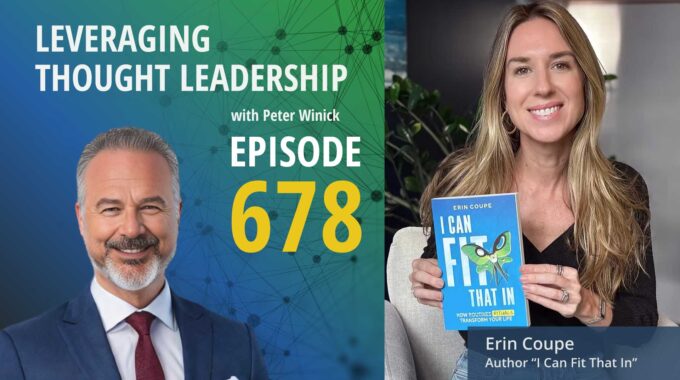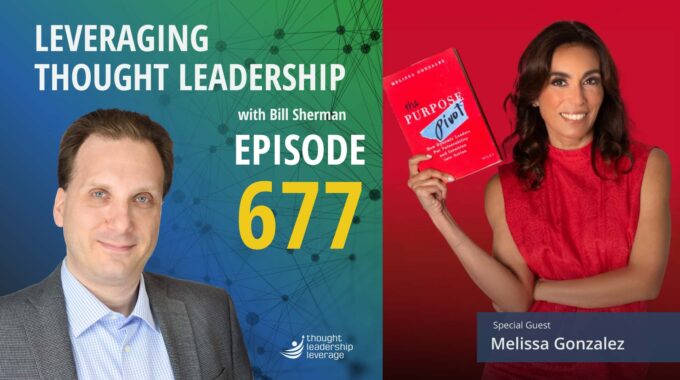The Hidden Cost of Corporate Pressure—and How Leaders Can Rise Above It This episode explores…
Leveraging Thought Leadership With Peter Winick – Episode 102 – Lori Ames
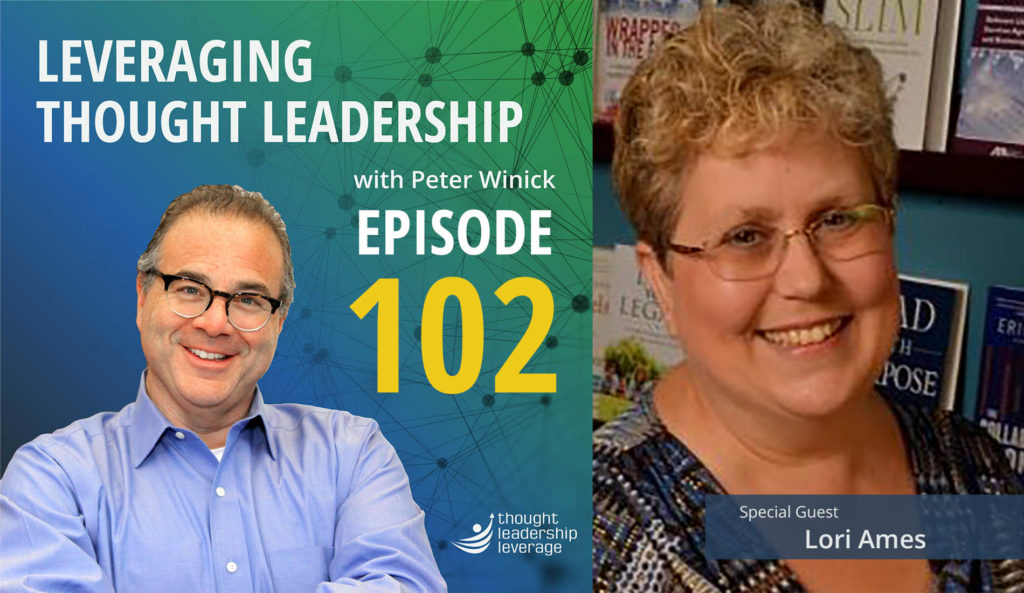
Business books have changed. Once, there was a solid focus on units sold, but in today’s market, the focus has shifted. Now, books are a tool to increase your reach, brand recognition, and cache – and giving them away can be just as profitable as selling them!
Our guest is Lori Ames, Founder and CEO of PR Freelancer Agency. Lori sits down with Peter to share her expertise in publicity, public relations, and marketing for non-fiction authors.
Listen in as Lori gives advice on how to approach a PR firm, determining the long-term purpose of your book, and why books no longer have a “shelf life.” In addition to book publishing, Peter and Lori discuss the effects of having an outdated website or blog, and the benefits of hiring a PR firm to handle the details of your content marketing.
If you need a strategy to bring your thought leadership to market, Thought Leadership Leverage can assist you! Contact us for more information. In addition, we can help you implement marketing, research, and sales. Let us help you so you can devote yourself to what you do best.

Transcript
Peter Winick And welcome, welcome, welcome. This is Peter Winick. I’m the founder and CEO of Thought Leadership Leverage. And you’re joining us today in our podcast, which is Leveraging Thought Leadership. Today, my guest is someone that I adore is Lori Ames. Lori Amess is the Founder and CEO of the PR freelancer agency. She’s been involved in the book publishing and book publicity since the early eighties. She received her degree from Hofstra in 1979. So shout out to Hofstra or the Harvard of Hempstead Turnpike is it’s I’m an alum as well. She worked briefly for a mass market publisher. and began her PR career at a boutique book publishing agency in New York. Then she was at William Morrow. She returned to the boutique agency. And then in 2010, she was helping them run their day-to-day business. In late 2010, Lori’s son was diagnosed with an inoperable malignant brain tumor. So she left the fast-paced world of Manhattan to care for her son and in the process set up her own agency. Her son Robert is doing well and plays an important part of the company. Lori’s a busy lady. She serves at the Dean’s Advisory Board at Hofstra. She’s a regular speaker at principles of marketing classes at the Czar business school, and she has been way deep in publishing for way long and seen lots and lots of things. So I’m proud to call Lori a friend. Lori, welcome.
Lori Ames Thanks, Peter.
Peter Winick Cool Lori’s usually the one booking people for things like this so it’s sort of you’re in front of the mic today how does that feel you can’t blame your publicist
Lori Ames No, I can’t. Actually, I CAN blame my publicist, but I think I’d lose.
Peter Winick It’d be an argument in your head. So let’s just dive right in. So you do a lot of work in book PR, but let’s talk about sort of the non-fiction space where you spend a lot time, and you’ve been doing this for quite some time. So what’s the same and what’s different in terms of if I’m an author and how I should think of engaging a PR firm?
Lori Ames In non-fiction book publicity, particularly in business books where we specialize, it’s not so much about selling books anymore. It’s more about using your book as a business card, really, to either get more clients for consulting, to secure speaking engagements. Book sales has changed. Years ago, gosh, your book was on the shelf for, what, 10 weeks, and then it was sent back. Now it’s available forever. but people don’t buy the same way. So unless you’re working with organizations that are going to buy bulk copies of the book, 25 to 500 copies at a time, and you’re gonna funnel those through an organization like 800CEO Read, which has their own best seller list, it’s hard to sell books. You’ll sell ones and twos, but you’re not gonna sell probably enough ones and two to make a best seller anymore.
Peter Winick So let’s dive into that because I think, you know, again, a lot of people dive into this space and they’re brilliant and they are well accomplished and they world class at what they do, whatever that might be. And then they dive into the book world and they apply their logic and their common thinking and their business acumen and it just doesn’t add up, they’re a different metric. So you know it’s interesting to hear one of the top PR people say, you the outcome of PR isn’t necessarily to sell books because at first blush you say, well geez, what’s the point, right? But the point, as you said, is. to get the right books in the right hands of the right people that you can serve with other things, right? In terms of the other things that you do as an author thought leader speaker, right? So whether that’s consulting or that’s workshops, et cetera. So talk about that because it’s really now a very laser focused approach as opposed to, you know, a big market approach. It’s sort of a long tail problem now.
Lori Ames And that comes up a lot even when I’m talking to new authors and potential clients. You said logic. Logic doesn’t play into book publishing really anymore, I don’t think.
Peter Winick But there’s a quote.
Lori Ames No, don’t quote me on that. You know, I always ask authors when I’m talking to them after we get through the introductory part and I find out what the book is about and whether the topic itself is a good fit for us, I say, what are your goals? If the first goal out of an author’s mouth is selling books and that’s above and on to anything else, I usually will recommend another agency, because they’re not going to be happy at the end of the campaign. If the answer is I want to increase my name recognition, I want increase my brand, I want to use the book as a way to get more business because that’s how I make my money, I’d like to make Entree into the speaking world a little bit and I’m willing to put in the time to do that, bingo, we’re a match, that’s fine.
Peter Winick So let’s talk about that because in the old days, and by the way, it’s not that long ago, maybe 10 years ago or so.
Lori Ames We just made it sound like we were both in this business for 200 years already.
Peter Winick Right, right, right. With Guttenberg, right? As they’re coming off the press.
Lori Ames First press.
Peter Winick So, what I was going to say is, if it’s not about selling books, right, I think, you know, in the old days, where I was gonna go is, there was an instant gratification, right? You did this campaign, you, know, unicorns and rainbows, and then all of a sudden I’m number 11 on the bestseller list, and I’m feeling great, right. Like, that’s a win. Even though that might not have actually done anything, long-term, measurable and sustainable for your business. Now, what you’re saying, and, I love your logic, which is why you and I think quite similarly. is you got to think of this an investment, it’s an investment in brand, it’s investment in awareness, it’s getting you out into a different playing field at a different level, and it’s not gonna be a get rich quick thing, right? You have to think about, you know, I always tell my clients, well, think about the investments you’re making as a capital investment, and it a long-term investment that you want to amortize over two years, three years, five years to get solid returns. What would you add to that?
Lori Ames You know, books don’t have a shelf life anymore. So you can use the same book for two, three, four years, as long as the content is relevant to continue to build your brand and to continue, to use it to be quoted in articles, sometimes it’s as simple as a small quote and a two sentence quote in a major piece that somebody at a major organization sees and says, Hey, Investors business daily thought this guy was important enough to quote. Maybe we should see what he has to say, right? They don’t really care whether there’s a book or not. The book is for us a door opener with the media It gives us a reason to have a conversation
Peter Winick And there isn’t an expiration date, right? So if you’ve been quoted in IDB or WSJ or whatever, you know, when you put that up on your website, you don’t have to put a footnote that says three years ago. So I’m not relevant, right. It’s, it’s, you’ve got that credentializing that gravitas that comes with being in an outlet like that.
Lori Ames Right. But I don’t like it when you’ll only see things that are three and four years old. That’s why publicity is always ongoing. You can include the bigger ones, but there are a lot of smaller blogs and websites that people are going to. We have so many generations doing things, but everybody’s searching online. So even on my own website, and it’s, of course, like the shoemakers, children who don’t have shoes. I try to keep the clips that we get for our clients current, you know, try not to have anything that’s more than a couple of years old, trying to slip new ones in all the time. People are funny when they go to look at websites. If something’s dated and it’s old, they’re going to think that you’re no longer relevant. relevant. And that’s why when authors also say that they want to write a blog, and I’m like, well, unless you’re going to write two or three times a month, don’t do it. Because the first thing somebody’s going to do is click on your blog, see the last post was 2015, and say this person just either doesn’t have time for me or their blog, or this person doesn’t care, or they gave up.
Peter Winick or they’re lazy. Or I mean, there’s a little bit of a workaround around that. You can change your settings on your blog so it’s not dated. But that’s a bit of workaround. I want to ask you sort of two big things, but let’s start with one. I’m fairly new into the space, right, in terms of thinking about writing a book, and everybody and their mother has an opinion about publishing for some reason, right? So if I was at a cocktail party and was talking about industrial plumbing. Most people wouldn’t jump in and think they have an opinion about, you know, I have a friend that used the toilet once, right? But in the book world, for some reason, everybody’s got a cousin, a story or whatever. So if I’m going down this path, give me a sort of paint a picture for me of what the market looks like. You’re an author, right. And take it from sort of like the big New York houses to, you, know, create space and then sort of all the interesting and creative, I don’t want to call them self publishing, but the different hybrid models in between. and the things you might want to consider as you’re going down that path of choosing how to publish.
Lori Ames Well, with the traditional publishers these days, they’re fewer and farther between that don’t fall into that hybrid space, because some of even the bigger name publishers want you to do what they call an author buyback. So that’s their way of not being hybrid, but in the end, if you have to buy 2,000, 3,000 or 5,000 copies of your book, you’re basically paying to have your book published.
Peter Winick So let me just push on that to decode, because I have a client that’s got sort of trapped into this now. The perception is, and I won’t reveal names, but client got an advance. So here’s some cash now, like you would normally get in advance on the typical tranches. And then obviously buried in the contract is you have to buy 2000 books a year at wholesale each year for the next three years. And they never really did the math on that, but it was basically, you know, let’s say for argument’s sake, they got a $50,000 advance and had a liability of $150,000 in books they needed to buy. The publisher has zero risk at that point. I call it the worst of both worlds, where you’ve got the worst of the self-publishing model where you’re taking the financial risk, but no upside. So just because you’re getting an advance, you have to net that out because that often isn’t what it appears to be.
Lori Ames Most times, it’s not what it appears to be. And with the hybrid publishers, I mean, you have hybrids or self-publishers, and I’m not gonna name any names because they all do a good job in their own right for what they charge, but you have some where it can cost you $150,000 to publish your book. But you’re gonna get an absolute beautiful book in full distribution. True. And you can spend the cost of 2,000 books at cost plus $2 per book and get a nice trade paperback and not make as big an investment. So.
Peter Winick The choice has to be… Right, so you can spend $20,000 or $150,000, ex-marketing, just to get the book out.
Lori Ames and you have to decide what your goal is beyond that because you still have to pay for marketing. If there’s advertising, you have pay for that. You have to for publicity. And if your goal’s to be on the New York Times bestseller list, you might have to pay somebody to orchestrate that too. So then you’re talking another $152,000. Yep. Is. $500,000 as an investment worth it, but people don’t think about that. And then there are smaller hybrid publishers, as we’re calling them, where they do a beautiful job and you only have to pay maybe $5,000 in the end after all the costs. And then you have money to do marketing. And when you hire a publicist by yourself to do your promotion, as opposed to your published by a traditional publisher, where they hire the publicist. There are different targets and goals and priorities. When we’re hired by a book publisher, our loyalty is to the book publisher. We have to do what they want. We have create a really good campaign, but we have to drive everybody to the publisher’s website.
Peter Winick So they can capture the margin on the book. So they can sell books.
Lori Ames But for most authors, it’s much more beneficial if traffic’s being sent to their website because then if somebody’s not buying a book, there’s still a chance to sell them on a training program. There’s still chance that they’re gonna look to you for something else. So there are so many things that have to be taken into consideration these days and sometimes authors are just like, wow, I got this offer from a name publisher and I’m signing it, I’m doing it and I can brag about it And in the end, it bites them in the…
Peter Winick Wherever it bites them. So, but, but I think the issue and you’re right is you have to think about your relationship with a publisher, like you would any business relationship. Is this a vendor relationship? Is this, a strategic relationship? Is this partnership? Right. And I think what often happens, and it’s not because publishers are good or bad or people, it’s about alignment. So a publisher’s business model, traditional publisher is they, the only way they make money is selling units, number of units times profit per unit. Less cost period that’s it right and that needs to work for them for a thought leader for an author or speaker You know most authors and thought leaders the actual direct dollars that are generated from book sales You know your royalty or even if you’re self-publishing 10 bucks a book Whatever it is in the single digits in terms of the percentage of their annual income that it represents It is not the end-all be-all. So just you have an inherent conflict there where there isn’t alignment So the speaker says hey, you know, I got this keynote and I’m going to get 25 grand and the client is going to buy 300 bucks. And they’re like, yeah, but I don’t care about the books because what am I making, $2 a book? And that’s just math. Right? And I think sometimes you have to think those things through because incentives drive behavior. So would you agree, disagree?
Lori Ames I agree with that, and people who are listening to this shouldn’t think that no book ever just sells. There are certain authors who have that cachet, of course, who are going to sell, particularly in the fiction space, but there are those in the nonfiction space who sell, but many of them sell because they’re speaking and there are all these bulk sales that come with it.
Peter Winick Correct. And they’re already established. And that’s about being sort of a system thinker, right? If I’m speaking 50 times a year, and every time I speak, I’m in front of 400 people, and you know, a third of those people will buy books either directly or indirectly. You have a built-in market, right, so that’s, you have to extrapolate that. And then you say every time, I speak you know or every three times I speak I pick up a consulting gig, you to think about each of those things as a connected contributor to a system. So let me give it a little bit. but let’s assume Lori wasn’t in the PR biz, but knows everything she knows, and you were a first-time author, and you’re about to talk to three or four PR people. What are the things that you would ask of them so that you can make a wise choice? And obviously the wise choice is to pick Lori, but let’s just say.
Lori Ames Well, not always. There are some times where it’s more important. Another firm might do something differently. It depends on a couple of things. Before you even talk to a PR firm, you have to decide how much time you have put into PR. Are you working full-time? Do you have time to write guest content? Are you going to have time travel? Do you time to stop in the middle of the day. Then when you go to the PR firm, you can say, well, how would you go about this? Where are some of your strongest contacts? What do you see would, what do you think would work for my book? And if a PR agency doesn’t ask to see your book before they write a proposal, then that’s not a good agency. Okay. Any agency should, after the conversation, and an author can talk all they want. but until you see how the book is written, how it’s edited, you know, the nuts and bolts and the meat of the book, it’s hard to decide if it’s the right book to work on. I don’t say yes to every product.
Peter Winick Got it. But let’s talk about that because if a PR firm is great at marketing children’s books or science fiction or something like that, I believe in specialization. So the fact that you’re in the business book space, you’ve done way more books than probably any author that you’ve worked with, just by the nature of your business, which gives you a perspective and intuition as well as logic and experience that says, ah, You know, here’s what I would be doing if I was writing a marketing book now or a leadership book now or whatever. And I think it’s, you know, there’s a little bit of that becomes a consultative nature of your relationship where you can guide the author. Cause the author has only done one, two, five books or whatever, isn’t as tuned into the marketplace as you are.
Lori Ames And you know, authors sometimes will call, I had a call the other day with a potential client and his first question was, how many bestsellers have you worked on?
Peter Winick Wrong question.
Lori Ames And I’m like, that’s really not going to tell you anything about what the landscape is right now in publishing and in media. And I went through the whole phone call and finally, towards the end of the phone call, I got him to tell me some other goals. And once we hit those goals, then all of a sudden at the end of an hour, I’m finally getting excited because those were things we could attain, more recognition being known for this, being quoted. Those are the types of things. Most of the competition in my field, a lot of us have been in the field the same amount of time. We do know a lot the same people. You have to decide really how many people will be working on your book. Is the person you’re negotiating with going to be the person you speak to through the whole campaign? Or are you gonna be pushed down to a lower level staff who’s gonna handle everything and you’re never going to speak to the. person at the top again. Some people need a bigger agency. They’re very time intensive and they need to have 10 different people doing 20 different things. But for most campaigns, you don’t need that. So it’s a personality fit. It’s the types of books that somebody specializes in.
Peter Winick So let me ask you this. Would you agree that the person that asked you how many bestsellers you’ve worked on would have better question for that person might have been, hey, here’s my story. Given what I just told you and what my goals and objectives are, can you tell me a couple of other people that are sort of similar to what I’m attempting to do that you’ve work with?
Lori Ames That would have been a much better question. But that wasn’t what was important to him. So in the end, I did write a proposal, I did send the proposal. When we have our second conversation, if he is still fixated on being a best seller, I am going to recommend another agency. Because if that truly is the goal, you can’t match that expectation. That’s not something anybody has control of. So I try to under promise and over deliver. and I try to identify client expectations so that you can fulfill them. And authors sometimes don’t know what to ask. My favorite author is the one who says, I don’t what I’m supposed to be asking. What should I ask you? Right. I said, well, ask me how long I’ve been in business. Ask me who’s on my team. Ask me the books we’ve worked on. Ask me for recommendations. Look at my website. See the current clients. You know, learn about us. Just don’t send an RFP to 20 people and say, fill it out. And I actually had somebody once send an RFP, which was really odd for a book publicity and I wrote back to them and I said, listen, I said I received the RFP and I have no problem filling it out, but you didn’t ask these five questions and those are way more important and I ended up getting the job.
Peter Winick I would imagine.
Lori Ames because I don’t have a filter, which doesn’t always work.
Peter Winick It’s a New York thing, there you go. Just no filter. No filter. So let me, for the last question before we have to sort of wrap up here. The other thing I hear again from smart people that book a PR firm is, you know, you’ll ask them, well, what is the plan and the strategy and the tactics? And you get a little bit of a blank slayer and they say, you know, I kind of don’t know, don’t understand what they’re talking about with Instagram and social media and placement and retweets but You know, I guess they’re good at what they do. So, so break that down for me in terms of not the technical Instagram versus LinkedIn, but how you have an obligation to yourself to actually understand what you’re paying someone to do and seeing if you believe in it and not getting, uh, you know, enamored in this, you know, Gen Y mumbo jumbo of, uh, retweet, whatever. the crotch of the old guy.
Lori Ames Well, if you don’t understand what’s in your publicity proposal, then that’s not the right agency for you. Things should be explained clearly. For books, I mean, especially when it comes to social media platforms, Twitter and LinkedIn are usually the most important. And I would say 95% of business book authors and general nonfiction authors are fairly active on LinkedIn. Does Twitter do anything? Probably not, but if you’re not on Twitter, everybody notices. So it really depends. So we do offer social media support as part of our package and I have people who specialize in that, but it depends. Your social media platform’s important to get a book deal.
Peter Winick I wasn’t knocking social media when I was looking. I think the critical part of it is the lack of understanding people have and what they’re asking people to do or paying people to.
Lori Ames Oh, yeah. Social media is just one piece of a campaign. So if somebody is asking you to tweet all the time and this and that, most executives don’t do that themselves and don’t have the time to do it. So they either have a team already or they just need some help and you just ask your PR firm to take over your social media for the duration of the campaign and then just try and keep it up after. Awesome. But what’s really interesting is, and we sort of glossed over it, is when You put a proposal together for a book, for a publisher, even if it’s a hybrid publisher. They’re more interested in your marketing strategy than they are in the content of the book. Have you looked at a book proposal lately?
Peter Winick You’re a thousand percent right, unless you’re a one of a kind, you survive being eaten by a bear and then became the CEO of General Electric or something like that, unless your story is that far out there, the big PR houses are going to spend equal to if not more time looking at your marketing platform, your social media presence, your ability to market yourself and other domains. So oftentimes being a successful speaker indicates to a publisher, this guy or gal can sell. right? They’re out there, right? Their names out there etc.
Lori Ames And that’s where, to me, that’s where social media comes in. They look at how many followers you have. So we sometimes will work with authors before they’ve even written their book to help build their presence.
Peter Winick and build it before you need it, right? And the time to do that is not three weeks before a pub date.
Lori Ames No, no, no. Some people think it is.
Peter Winick Well, this has been great. So I have to go back and re-listen to this because there’s just so much being bantered about here that’s really, really good stuff. So I appreciate your time. I appreciate you effort and energy. And I greatly admire you as a human being and as a PR person. So proud to call you a friend, Laurie. Thank you.
Lori Ames Thank you, Peter. It’s a pleasure.
Peter Winick To learn more about Thought Leadership Leverage, please visit our website at ThoughtLeadershipLeverage.com. To reach me directly, feel free to email me at peter at Thought Leadership leverage.com and please subscribe to Leveraging Thought Leadership on iTunes or your favorite podcast app to get your weekly episode automatically.


